South Korea Says Still Working To Transfer Iran's Frozen Funds
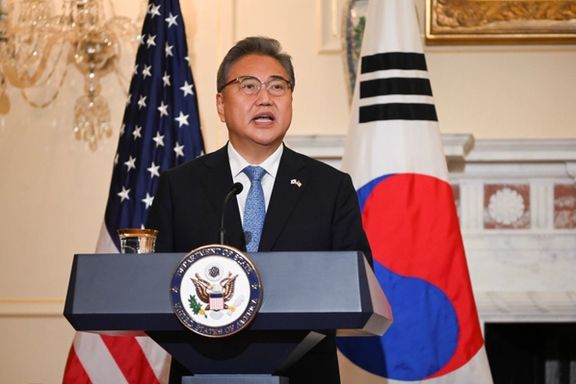
South Korea has announced it is actively coordinating with relevant nations in their ongoing endeavors to unfreeze Iranian funds held within its banking institutions.

South Korea has announced it is actively coordinating with relevant nations in their ongoing endeavors to unfreeze Iranian funds held within its banking institutions.
In a statement released on Tuesday, South Korea's Foreign Minister Park Jin confirmed that he spoke to Hossein Amir-Abdollahian, his Iranian counterpart, and that he is working to resolve this matter.
This comes following a recent diplomatic agreement between Tehran and Washington, in which Iran agreed to release five imprisoned American citizens in exchange for the release of $6billion frozen Iranian assets in South Korea.
According to reports from South Korean media, these funds, earned from oil sales before the US reimposed sanctions on Iran in 2018, have been transferred to the Swiss Central Bank, after which they will be converted into euros and then transferred to an account in Qatar that Iran can access.
American news source CNN, reported in August that the transfer of funds from South Korea to Qatar is likely to take 30 to 45 days.
The official news agency of the Islamic Republic has also confirmed the continuous efforts to transfer Iran's frozen assets from South Korean banks. According to IRNA, Amir-Abdollahian expressed optimism, stating that this development could “mark the commencement of a new phase in bilateral relations, and he welcomes any initiatives that contribute to enhancing ties between the two nations.”
Presently, the five American citizens are under house arrest in Iran. However, specific details regarding the Iranian prisoners to be exchanged with the five individuals as part of the recent agreement have not been publicly disclosed.
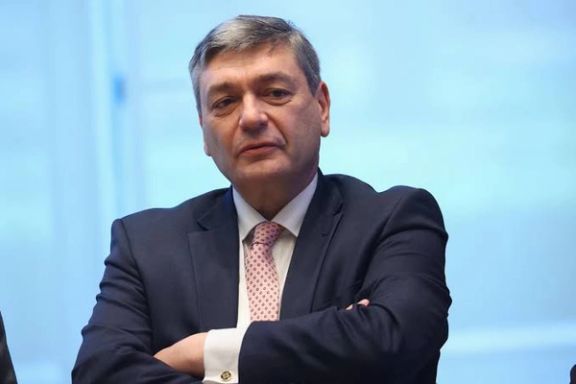
Russia and Iran are actively negotiating a new treaty to strengthen and expand their bilateral cooperation, according to Russia's Deputy Foreign Minister Andrey Rudenko.
Deputy Minister Rudenko made this announcement during a session hosted by the Valdai Discussion Club, highlighting the increasing positive momentum in Russia-Iran relations in recent years.
"We are working on a new major treaty with Iran, which will encompass, among other things, our key areas [of cooperation]," stated Deputy Foreign Minister Rudenko.
The development of this new treaty underscores the commitment of both nations to strengthening their partnership and fostering closer ties. Over the past few years, Russia-Iran relations have steadily progressed, promising further advancements in their collaboration.
During the Iranian President's visit to Moscow in January 2022, he presented a draft of a 20-year cooperation agreement, which would update the previous 2001 version. However, Moscow has yet to sign this proposed agreement.
While Iranian officials had previously suggested that preparations for the agreement were finalized and anticipated a swift signing when the two presidents met, recent reports indicate that additional preparations are deemed necessary.
One factor affecting the pace of these negotiations is the impact of international sanctions on Iran's oil industry. Notably, major Chinese and Russian companies, recognized for their global presence, have been cautious about engaging in business with Iran due to these prevailing sanctions.
Despite Iran's existing 25-year contract with China, signed on March 27, 2021, and ongoing negotiations for a 20-year economic trade deal with Russia, there has been public discontent in Iran regarding these agreements. Concerns have been voiced by many Iranians who fear that such pacts may potentially compromise the nation's interests.
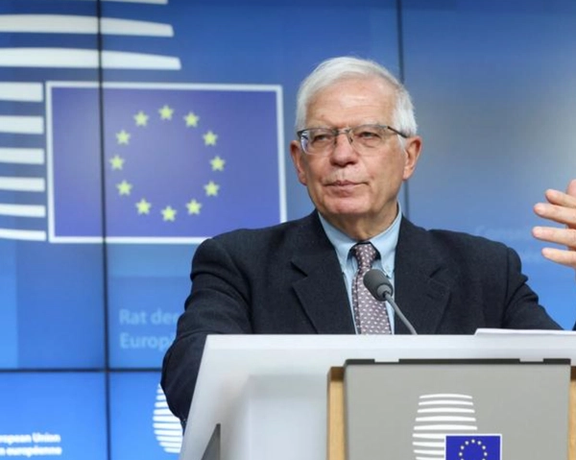
EU High Representative Josep Borrell confirmed On Tuesday that the Swedish citizen detained in Iran for 500 days works for the European Union.
He assured that everything was being done to obtain his release, although his office kept Iran’s hostage-taking under wraps all along, while holding talks with Iran on the nuclear issue.
Sweden on Monday said a Swedish citizen in his 30s was arbitrarily detained in Iran last year and called for his immediate release.
The Swedish government didn’t identify the man, but Borrell named him as Johan Floderus, a Swede who is working for the European Union.
Citing anonymous sources, the New York Times said Floderus was arrested on a private trip to Iran for possible use by Tehran as a bargaining chip in efforts to seek concessions from the West.
Iran’s Foreign Ministry spokesman, Nasser Kanaani, told the semi-official Fars news agency that he had no information on the case. However, Iran had announced in July 2022 that it had detained a Swedish citizen.
The Swedish Foreign Ministry said the man was detained in Iran in April last year but declined to give details.
Last month, the United States announced a “prisoner exchange” deal with Iran to free five US citizens. At the same time Washington allowed $9 billion of Iran’s frozen funds in South Korea and Iraq to be released.
The EU, Germany, France, The United Kingdom and the US have been trying to reach a deal with Iran to revive the JCPOA nuclear agreement abandoned by the Trump administration in 2018.
Reporting by AP
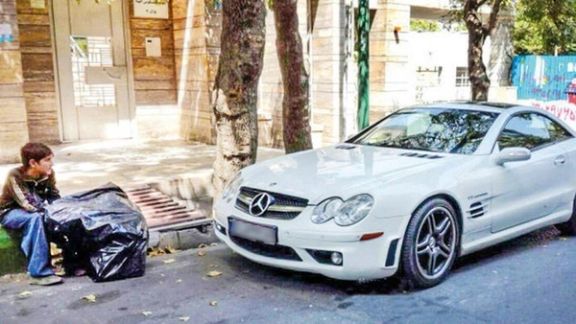
With one in three Iranians living in absolute poverty, a renowned economist has said authorities are using statistics in a power struggle instead of solving the problem.
Farshad Momeni, a professor at a Tehran university, highlighted the distressing reality of widespread poverty, as per recent official data analysis but warns that some government officials are misusing and manipulating the data in the name of justice.
“This has given rise to a situation where individuals assert their ability to eradicate absolute poverty within 14 days, while others escalate these assertions, leading to a disconcerting competition among segments of the power structure to outdo one another with baseless statements,” he said.
He also pointed to a dramatic decline in middle-income levels over recent years, which has narrowed the gap between those living above and below the poverty threshold.
In Iran, the "poverty line" signifies the income threshold necessary to meet a household's essential needs, with incomes falling below this mark labeled as "absolute poverty." Iranian authorities report that the poverty line for Tehran residents stands at around 300,000,000 rials (approximately $600) per month, which is three times the country's minimum wage.
However, figures alone are not enough to grasp the complexities of the poverty landscape, Momeni said. He argued that it is essential to grasp the dynamics of development to appreciate the precarious position of the middle-income class and reiterated that using the stark statistics to gain popularity in government would do little to help the actual problem.
In a society grappling with these challenging realities, the economist's candid and sobering analysis serves as a wake-up call, emphasizing the urgent need for comprehensive and informed policy responses to address the multifaceted issue of poverty in Iran.

A Swedish citizen, part of the EU diplomatic corps, has been covertly detained in Iran for over 500 days as part of Iran's hostage diplomacy, reports The New York Times.
Johan Floderus, 33, who worked for the European Union's diplomatic corps, was arrested at Tehran airport in April 2022 as he prepared to depart the country after what was described as a private tourist trip with friends.
In July 2022, the Iranian government released a statement announcing that it had apprehended a Swedish national for espionage who was being held in Evin prison, however they did not disclose any further details.
The New York Times spoke to six individuals with first-hand knowledge of the case, who all confirmed that Floderus’ had nothing to do with any espionage claims.
The Swedish Ministry for Foreign Affairs said it would not comment on the details of the case, citing a need for secrecy. “A Swedish citizen — a man in his 30s — was detained in Iran in April 2022,” its press department said in a recent email. “The Ministry for Foreign Affairs and the Embassy of Sweden in Tehran are working on the case intensively.”
“We understand that there is interest in this matter, but in our assessment, it would complicate the handling of the case if the ministry were to publicly discuss its actions,” it added.
Floderus was detained when EU diplomats were hard at workto broker a nuclear deal between Iran and the United States. Two top EU foreign policy officials visited Tehran in mid-2022, while they kept his detention hidden from the public and European institutions. It is not clear to what extent the fact that one of their employees was held hostage impacted their mediating role.
Hannah Neuman, a German member of the European Parliament commented on the case on social media saying that parliament should have been informed about Floderus’ arrest, as well as attempts to secure his release and the impact on JCPOA negotiations.
She directly criticized the EU's policy of keeping Floderus’ arrest and detainment a secret as it may impact attempts to revive nuclear diplomacy. Others called for a policy re-think. “A serious recalibration of policy is needed,” said Kasra Aarabi, an academic, who took to social media to comment on the case. He further demanded the proscription of the IRGC and consolidated international action against the Iranian regime.
The European External Action Service, the diplomatic service for which Floderus works confirmed that they have been following the case very closely and that his arrest “underlines the very concerning tendency of Iranians to use EU nationals or Iranian dual nationals as pawns for political reasons." However, neither Swedish nor EU authorities have publicly discussed the situation, citing the need for confidentiality.
“This case has also to be seen in the context of the growing number of arbitrary detentions involving EU citizens,” added Nabila Massrali, a spokeswoman for the EU bloc’s diplomatic body. “We have used and will continue to use every opportunity to raise the issue with the Iranian authorities to obtain the release of all arbitrarily detained EU citizens.”
The arrest of Floderus follows a pattern of Iran detaining dual nationals and foreigners on dubious charges to use them as bargaining chips for prisoner exchanges or to extract concessions and funds.
A recent deal saw five American prisoners being released in return for freeing up $6bn of frozen Iranian funds in South Korea, which puts an approximate price of $1.2bn per head.
Relations between Iran and Sweden have soured recently, notably with the sentencing of a former senior Iranian judicial official, Hamid Nouri, to life in prison in Sweden for war crimes committed in Iran. Iran has escalated pressure on Sweden in response.
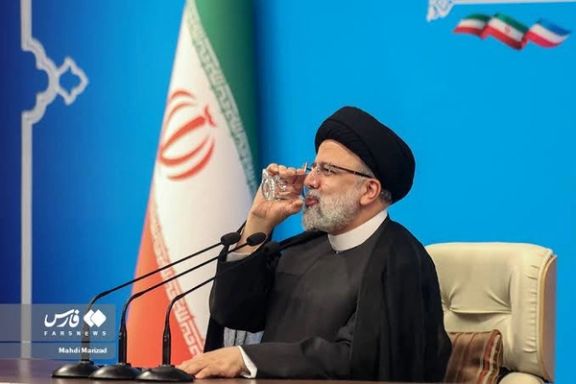
The Iranian government’s debt surged by 61% during the last budgetary cycle, amid a severe economic crisis, as reported by Parliament’s Research Center on Sunday.
The huge jump occurred during the first full year of Ebrahim Raisi’s presidency, dominated by hardliners, who insisted on continuing their anti-Western foreign policy and claiming that economic sanctions imposed on Iran can be defeated. The period spans from March 22, 2022, to March 21, 2023, or the Iranian calendar year 1401.
The annual borrowing total reached nearly $50 billion, representing 30 percent of the yearly GDP. This level of borrowing is unprecedented and indicates an increase in money printing by the government, which is likely to result in further inflation, since the borrowing was entirely from domestic state or quasi-governmental banks. In turn, these banks face huge debts and an unstable financial situation. Therefore, when the government borrows from these institutions, they have to turn to the Central Bank of Iran for liquidity and the central bank has to print more money.
To provide context, Turkey's total government debt is equivalent to 31 percent of its annual GDP, whereas in Iran's case, one year's borrowing alone has reached the same level.
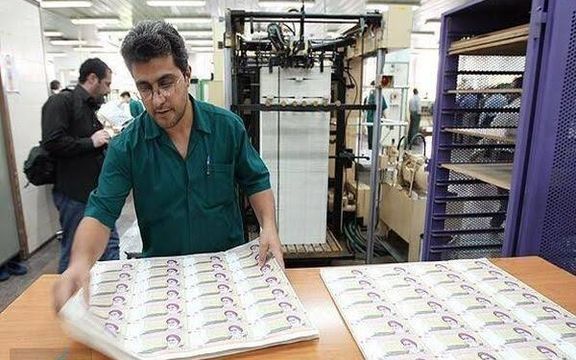
This development poses the question about Iran’s increased oil exports in 2022 and 2023, which should have provided financial resources to the government and forestalled more borrowing. During the period in question Iran sold around 1.2 million barrels of oil daily, mostly to China, and with high prices in 2022 it should have brought in at least $26 billion even if sold the oil at the discounted price of $60 per barrel.
Around $11 billion is provided at deeply discounted exchange rates to importers of food, medicine and animal feed. This means that around $5 billion is “wasted” on indirect subsidies. That still leaves around $20 billion for other government expenses, including 15 percent as share of the National Oil Company.
This is basically half of what the government needs from oil exports in order to balance its budget, and it explains why it was forced to borrow more, or to be precise, to print more money. But $20 billion in 2022 was probably more than the government had earned from oil exports in previous years since 2018, when the United States imposed sanctions on Iran’s oil exports.
One explanation about why the government fell into more borrowing in 2022-2023 could be that national reserves dwindled after repeated withdrawals since 2018. A report in August indicated that in the past decade Iran withdrew $140 billion from its National Development Fund, mostly since 2018, leaving an estimated small amount of $10 billion.
Oil exports are said to have increased in recent months reaching 1.5 million and in August surging to around 1.9 million barrels a day, as the United States relaxed its enforcement of sanctions to try to reach a nuclear deal with Tehran.
However, it is not clear how much discount Iran is offering Chinese importers to compete with discounted oil from Russia. In recent days, media in Tehran estimated that the government could be selling its oil for as little as $30 per barrel, given a statement by a top official that it was able to earn just half of what it expected from March to August of this year.
Annual inflation is already hovering at around 50 percent and the national currency has fallen by 50 percent in one year to 500,000 rials per one US dollar. The coming months will show if the higher borrowing will lead to even higher inflation.






